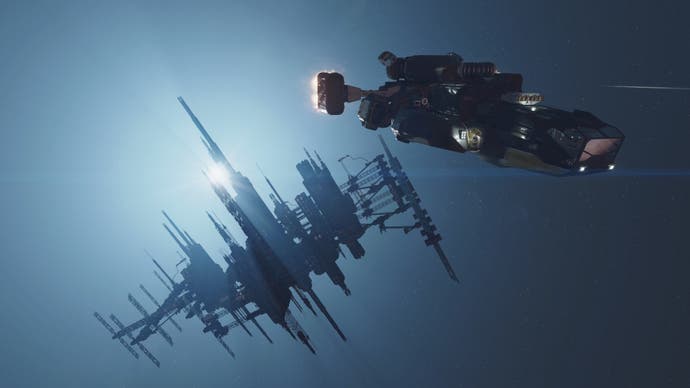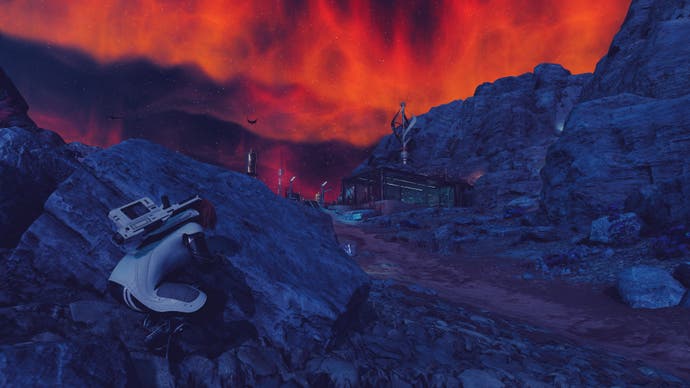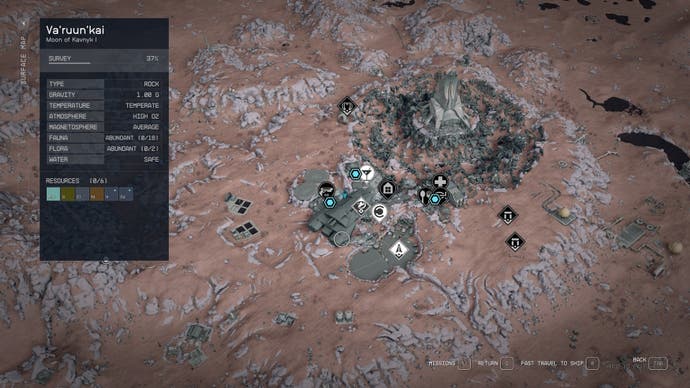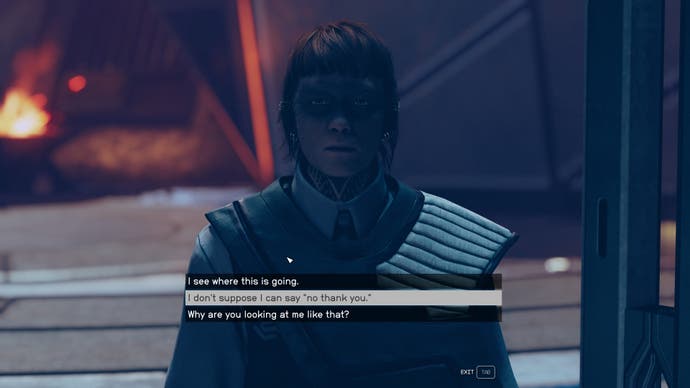Starfield: Shattered Space review - new planet, new problems
Lacking that va-va-Va'ruun.
Coming back to a game like Starfield - or indeed any Bethesda RPG - always begins with a series of inevitable questions. Where am I? What the heck am I doing again? And why can't I fast travel anywhere to get my bearings? Oh yes. It's because I'm over-encumbered. Again.
So begins the process of revving up that old Starfield muscle memory - wading through its copious menus to rid myself of inexplicable lumps of cobalt, nickel and other assorted sundries lining my pockets, all while trying to coax back half-forgotten memories of how I ended up at the bottom of a mineshaft dressed like a comic book mantis character. Ah yes, there was an attack on the capital by those big, horrible Xenomorph gloops that was quite exciting, and that big bank robbery that started me on the road to becoming a Freestar deputy alongside my mate Adam Jensen in a cowboy hat was pretty good, too. I was obsessed with Chunks, the most fascinating foodstuff in the history of video games. And how could I forget my terrifying space dad?
Outside of that, though, Starfield's call to adventure left me mostly unmoved at the end of last year, and much of what I did during the 30 hours I spent traipsing through its yawning chasm of repetitive, grey story missions (nearly all of which took place on equally grey and repetitive planets) has since fallen beyond the event horizon of its unerring blandness. Starfield's new paid expansion, Shattered Space, does its best to revitalise this enormous morass of an RPG, taking us to a new planet whose sky perpetually shimmers with hot pinks, deep reds and dark shades of purple, and putting us right in the morally-conflicted heartland of one of its most mysterious factions: the serpent god worshippers of House Va'ruun, whose citadel has just exploded in a mesmerising ball of ruptured space-time.
Visually, it's certainly the kick up the bum Starfield needs to tempt back wayward players, and it's the kind of immediate, graphically arresting world building you wished the base game had led with as well, instead of parping you out onto the beigest and most barren rock face this side of the known galaxy. Even before you get to the planet of Va'ruun'kai, Shattered Space makes a surprisingly good first impression, as simply travelling to any non-mission-critical star system after completing the opening prologue will kick off the expansion's initial distress call, luring you into the bowels of a large, cathedral-like spaceship that's all twisted up inside with bright glowing tentacles of space-bending energy rifts. Ghostly apparitions beckon you in further as you navigate its zero-g corridors, and if you weren't already getting big Alien (and specifically Prometheus) vibes from this place, then its climatic shootouts will leave you in little doubt of where Bethesda has drawn most of its inspiration from here.

As an opening salvo, it all feels like a tantalising glimpse of what's to come - and it's easily one of Starfield's most memorable sequences to date. Fights with teleporting space ghosts, tense exploration, frantic, gravity-defying gunplay, and an unusually fraught encounter with a trash compactor. Finally, Starfield has a pulse. But just as it starts to get going, Shattered Space plunges headfirst in the same old problems that plagued Starfield's original campaign, taking you on missions that once again turn inward and away from the exciting horizons that draw your eyes upward, and back down into the dirt and identikit lab facilities you've stomped through a dozen times before, making it feel like more of the same rather than something new and distinct.
Most of your time on Va'ruun'kai will be spent uniting its three main houses so they can come together and work out why half their city's now suspended inside a massive crater that's throbbing with a blue and ominous light. You'd think the sheer enormity of the tragedy that's just unfolded would be impetus enough to get them to pull their socks up without you having to babysit them all through it, to be honest, but such is the nature of Bethesda's 'you are the centre of the literal universe' power fantasy that Starfield's built upon.
Still, when its squabbling government ministers aren't choking over the Targaryen dictionaries they appear to have swallowed, they're quite a fun bunch to rub shoulders with. Religious stalwarts bristle against the more scientific minds of the city's elite, and everyone and their aunt seems willing to backstab and betray everyone else to get what they want. They're villainous in a very relatable, humdrum kind of way that makes it easy to pick sides and root for the underdogs, but not so despicable that they're outright bad hangs. Though on second thought, it's no wonder they need an outside hand to help them sort out this mess - they'd all murder each other in their sleep if they had the chance.

With so much double-crossing going on, the opportunity for player expression has arguably never been higher in Starfield, and over the 12 hours or so it will take you to complete the expansion's main campaign, its three-pronged story mission will regularly present you with choices and dilemmas that feel like they should have real weight to them - though the emphasis is, sadly, very much on the word 'should' in this case. One of the main problems I had playing Starfield the first time round was how each character interaction felt like a one-and-done decision that simply got put back in the cupboard the moment it was over, never to be seen, felt, or heard from again - and it's an issue that persists in Shattered Space, robbing its missions of the drama and tension they deserve.
It's a shame, as the setups are often wonderfully knotty, with empathy regularly waging war on violence and direct conflict. In the heat of the moment, there's a real sense that you're able to forge your own path through these problems, roleplaying them 'your way' to often satisfying effect. But time and again, Shattered Space fails to stick the landing, its rigid dialogue choices failing to capture and reflect the nuance you put into each choice and decision you made along the way.

For example, deciding whether to murder whole swathes of people - whether they're the hostages of an unfortunate negotiation gone awry, or they've aided and abetted the escape of an heir apparent so he can start a new life free from the religious bigotry rife in Va'ruun society - should feel like it has a tangible impact on what you're trying to achieve here, or at the very least affect how you, this so-called chosen 'Vindicator', are more widely perceived within this aloof and closed-off culture. But Shattered Space never truly commits to following through on any of these decisions - either in its dialogue or the reactions of your companions (looking at you, gormless nothing burger Barrett), or indeed anyone. It's constantly pulling its punches at the last second so the story can play out as intended, and there are times when you can even see how the ship will right itself before there's even a hint of it wobbling off course. In this way, it really doesn't seem to matter how you got from A to B, and it leaves the campaign feeling quite toothless as a result.
Heck, even the final decision in Shattered Space - which, to its credit, has the potential to completely up-end the galaxy's tea table, so to speak - is met with surprisingly little resistance or debate from your newfound friends on Va'ruun - as if this, too, was just another inevitable shrug of going through the motions that will be instantly forgotten again the moment I clap eyes on a new quest marker. Actually, I tell a small lie. It did finally prompt a reaction from Barrett (he hated it) - though when I, too, can pop his newfound funk of irritation back on the shelf and swap him out for a different and slightly more amenable companion back home, am I really still paying any kind of price for the decision I made?

Mostly, though, Shattered Space just feels like a missed opportunity. It's both the most enjoyable chunk I've played of Starfield (which is saying something), while also being the most disappointing. It stumbles over so many open goals it sets out for itself, whether it's shying away from doing anything remotely interesting with its gorgeous new landscapes, or muddying the action with limp and predictable gun fights. It also leaves some of its best ideas woefully underutilised - like the giant gravity bubbles that have seemingly no purpose whatsoever other than looking cool outside the crumbled citadel, or the swirling blue energy vortexes - which only ever appear as fantastical, sci-fi set dressing in its main missions, but out on the planet's surface are used for random little teleportation puzzles. It truly boggles the mind that these unique, and very expansion-specific ideas are just left on the table like this, and all it does is makes you wonder what might have been, instead of savouring what's actually there in front of you.
Far from shattering expectations, Starfield's first DLC simply begs more questions: will Bethesda ever be able to find the fun in this vast and lonely universe? And will I still have the patience to come back and try again when they do?
A copy of Starfield Premium Edition was provided for review by Bethesda Softworks.










